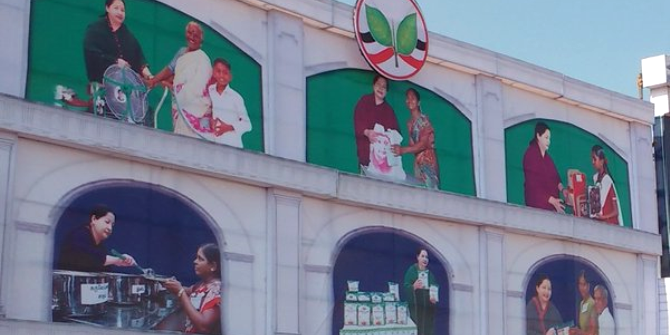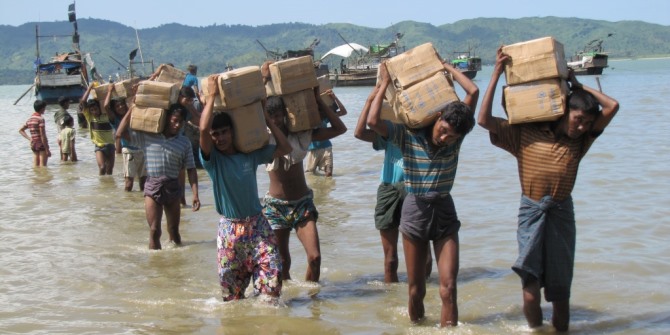Last week the AIADMK held off a strong challenge from the DMK to win a consecutive term in office for the first time since 1984. Andrew Wyatt and C. Manikandan discuss the battle between to two regional parties, which featured material promises, debates on alcohol prohibition and a subtle restructuring to the party elites.
This post forms part of a series of posts on the 2016 Legislative Assembly Elections. Click here to read more.
The AIADMK has just been re-elected to office and its leader, J. Jayalalithaa returned as Chief Minister of Tamil Nadu. The opposition DMK (and its allies) trailed by just over one percent of the vote making it an unusually close election. The AIADMK and DMK are regional parties that emerged from a Dravidian movement that celebrated the distinct culture of south India and argued for social reform. The 2016 election resembled the previous election in 2011 in many ways. The same two regional parties, the DMK and AIADMK, formed alliances that accounted for a large majority of the vote, and the same two party leaders faced each other. M. Karunanidhi has been the chief ministerial candidate of the DMK in 11 elections since 1971 and Jayalalithaa has fought six elections as the leader of the united AIADMK since 1991. National parties (and issues) were marginal to proceedings. The delivery of welfare and provision of public services were important campaign themes once again. Yet in spite of a high degree of continuity the election brought forward some obvious and less obvious changes. Most notably the issue of alcohol consumption, and the proposed solution of prohibition, was taken up by almost all parties. The elections were used to discreetly restructure the elites of competing parties by nominating ‘new faces’ and retiring some established leaders.

The AIADMK and the DMK made a long list of promises to voters in their manifestos. The DMK offered to waive student loans, give students laptops or tablets with internet access, and provide smartphones for poor families. The AIADMK promises included waiving farm loans, free laptops for school children from standard 10 upwards, and subsidised scooters for women. The press latched on to these eye-catching gimmicks deriding them as ‘populism’. However what the press missed is that Dravidian populism is a well-developed style of politics that esteems Tamil culture and argues for a people-centred style of politics.
The populist style of the AIADMK was very much on display in the election with Jayalalithaa claiming to have delivered many benefits to the people through various ‘Amma schemes’ and promising more of the same. For the DMK, Karunanidhi reminded voters of his connections to the Dravidian movement. In his speeches he referenced social reform themes, referring to religion and caste, as well as promising to attend to the material needs of the Tamil people. The populist formulations of the DMK and the AIADMK are certainly ambiguous, not least because they favour ameliorative policies rather than structural solutions to inequality, but they are broadly progressive. The provision of welfare and effective delivery of government services are justified as responding to the popular will. Important advances in the provision of subsidised food, health insurance and pensions driven forward by competition between parties in Tamil Nadu. There is certainly a debate to be had about the cost of subsidies but this should not obscure the larger welfare gains that have been derived from two populist parties in fierce competition with each other.
Looking for a competitive advantage the DMK opted for a policy of total prohibition in 2015. The policy is most popular with women and the DMK saw it as a way to decisively outflank the AIADMK government which relied heavily on revenue generated by government-owned liquor stores. The sincerity of the DMK was doubted by many as it seemed to appropriate an issue promoted already by other parties and movements. Campaigners like Sasi Perumal, who died while protesting, helped galvanise the formation in October 2015 of the People’s Welfare Front consisting of the Viduthalai Chiruthaigal Katchi, the Communist Party of India (Marxist), the Communist Party of India and Vaiko’s Marumalarchi Dravida Munnetra Kazhagam. The AIADMK was reluctant to join the consensus and eventually promised ‘phased prohibition’. Polarised opinions among voters and the fiscal consequences of ceasing to sell alcohol meant this issue raised the most uncertainty in 2016. In a characteristically decisive move Jayalalithaa began implementing phased prohibition shortly after being elected. Before she was sworn in it was announced that 500 liquor outlets in Chennai would be closed.
A less visible development was the shift of power within the parties themselves. MK Stalin, Karunanidhi’s son and the presumptive political heir, was very visible in the campaign. In a long lead up to the election Stalin attempted to refresh his personal image by using a more contemporary, professional style of campaigning. He travelled the state in a mass outreach campaign beginning in 2015. Even so, Stalin was not adopted as the chief ministerial candidate for the party. The elections were used to restructure the elites of the DMK and AIADMK in other ways. The DMK denied nominations to some middle level leaders said to have abused their positions when the DMK ruled the state prior to 2011. This was not a full purge but it showed the growing influence of MK Stalin in the party. The AIADMK engaged in an extensive reshuffle of middle level leaders and legislators. Only 57 of the 145 sitting MLAs in the AIADMK were re-nominated leaving around 170 seats open for new aspirants. Several AIADMK cabinet ministers were obliged to move constituencies reminding all second rank leaders that the will of the party leader is supreme.
Jayalalithaa certainly won a clear victory, securing 131 out of 232 seats, yet the 2016 election was very competitive. The AIADMK alliance lost both vote share and seats to the DMK. The AIADMK will be under pressure to deliver on its election promises. It remains to be seen what phased prohibition will look like in practice and how the state will generate additional revenue. Another generation of politicians, including Stalin and Anbumani Ramadoss of the PMK, presented themselves as leaders seeking younger and middle class votes. Whether this will displace a well established tradition of populist politics in Tamil Nadu is a fascinating question.
This post forms part of a series of posts on the 2016 Legislative Assembly Elections. Click here to read more.
Note: This article gives the views of the author, and not the position of the South Asia @ LSE blog, nor of the London School of Economics. Please read our comments policy before posting.
About the Authors
Andrew Wyatt is a Senior Lecturer at the University of Bristol, and is the author of Party System Change in South India.
Manikandan is with the Department of Politics and International Studies, Pondicherry University.








AIADMK won the Tamil Nadu assembly election 2016 in slight margins compared to 2011 performance. This is the result of various factors like women voters, third front contest by PMK, People Welfare Party and money power. AIADMK government faces various challenges viz. money deficit, inadequate electricity and employment for educated youths. Compared to Tamil Nadu assembly result 2011, the DMK performanced much better and become the opposition party. The DMK relied on the commander’s Stalin new style of campaigning which not only attracted votes but also people elevated him to the position of leader.